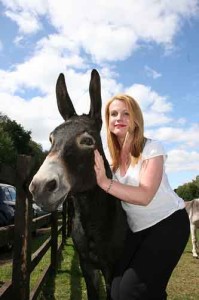A study to be published this week, has thrown new light on how visits to a UK charity that provides riding therapy with donkeys can create positive changes in young children excluded from primary school due to aggressive behaviour.
Internationally recognised researcher investigating the psychology of human-animal relationships, Dr Susan Dawson (PHD, MEd., PGCE), has completed a study exploring the experiences of five children aged between 7 and 10 years who had been excluded from mainstream education following incidents of aggression at school. The children visited a centre of The Elisabeth Svendsen Trust for Children and Donkeys (EST) over a period of months where they took part in the charity’s therapeutic riding sessions.
Dr Susan Dawson says: “The five children were chosen for the study after being excluded from mainstream schools due to aggressive behaviour and social, emotional and behavioural difficulties. I observed their visits to EST over a period of months and was amazed by the transformation in their attitude and the self control that they learned from their time with the donkeys. All the children responded very quickly to their visits and learnt to trust and empathise with their donkey. It was wonderful to see in some instances how they managed to take this new behaviour to their relationships with other children and even those who had struggled to make friends before were able to reach out and bond with other children, as well as forming close bonds with the donkeys they were riding.
“The most consistent therapeutic outcome identified was positive behaviour changes in children immediately before, during and straight after visits. The children also used the donkeys to explain or describe their own feelings or actions, like ten-year-old Romeco* who was also attending a knife aggression prevention programme, and said: “I think the donkeys were happy going outside, it’s better. Riding makes me feel chilled out it’s different to other things. Riding today was just gold.”
Eight-year-old Lilly* struggled to form attachments with others and reacted aggressively to her peers but was able to show empathy towards the donkeys and identified a strong and special bond with her favourite donkey. During riding sessions Lilly modified her behaviour so that it mirrored the calmness of her donkey, demonstrating an understanding of the effect that her actions can have upon those around her. Through her relationship with the donkey and progress with her riding skills she grew in self-confidence which can also help her development in other areas.
Staff at the children’s Pupil Referral Unit commented on the behaviour changes they’d seen during visits to EST. Teaching Assistant Felix said: “The kids get easily worked up and even the slightest error or comment from a teacher can result in violent or emotional outbursts but here the donkeys are sensitive to the children’s behaviour and feelings so the children listen more carefully to instructions and exercise more self-control when they’re at the centre.
“It would be easy for the children to get angry if the donkeys don’t do as they’re asked but this just doesn’t seem to happen. The children keep controlled and don’t react negatively as they would if they were not on the donkey.”
The study was based at EST, a charity that uses donkeys and riding therapy in programmes to assist children with a diverse range of special needs and disabilities at six centres across the UK.
*children’s names have been changed to protect their identities
The Midlands centre is based in Sutton Park.



